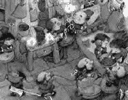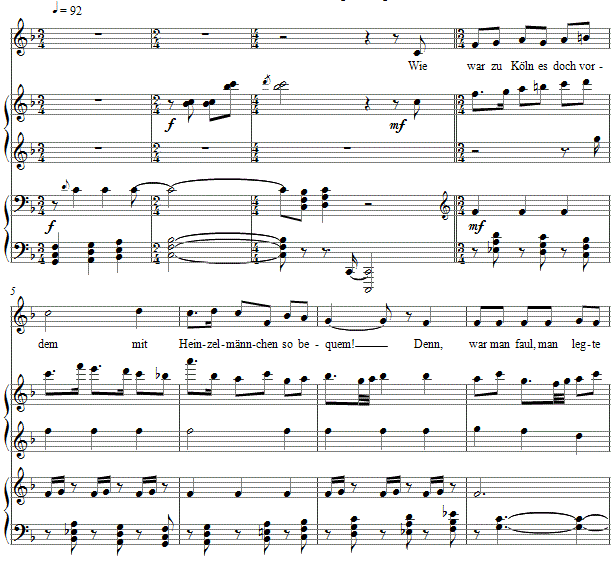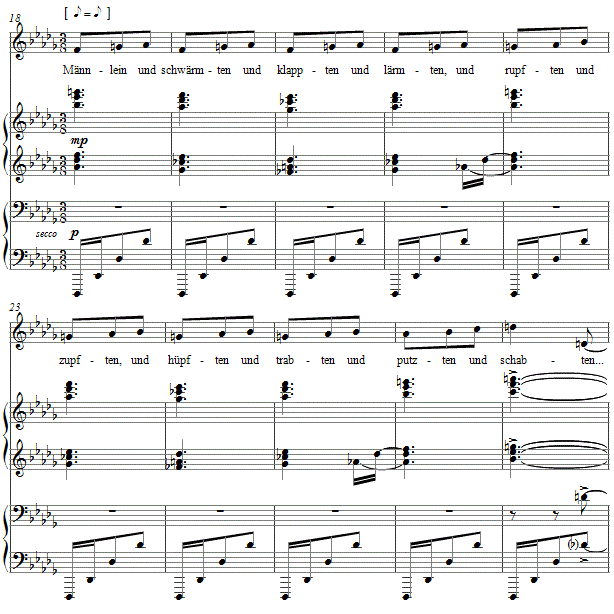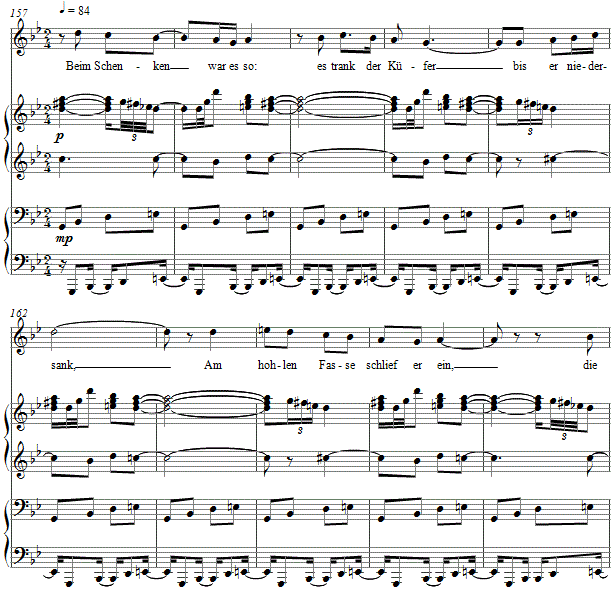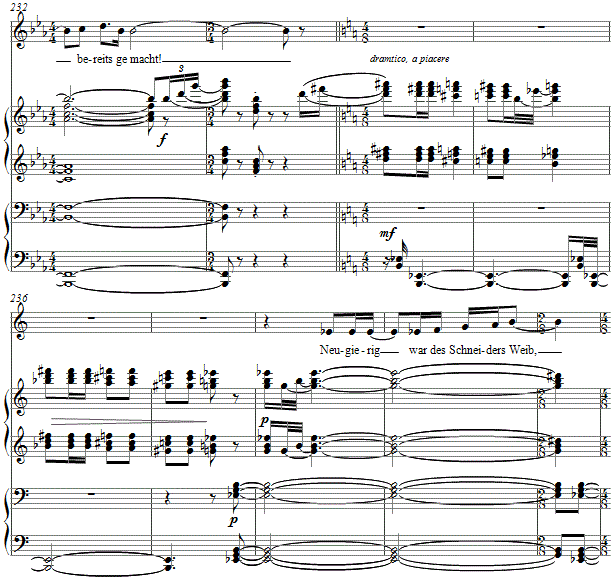Music and Texts of GARY BACHLUND Vocal Music | Piano | Organ | Chamber Music | Orchestral | Articles and Commentary | Poems and Stories | Miscellany | FAQs |
Die Heinzelmännchen zu Köln - (2006)
August Kopisch
for medium voice and piano, four hands [ 1 ]Susanne Paasch und Hartmut Steigelmann gewidmet
i.
Wie war zu Köln es doch vordem
Mit Heinzelmännchen so bequem!
Denn, war man faul,... man legte sich
Hin auf die Bank und pflegte sich:
Da kamen bei Nacht,
Ehe man's gedacht,
Die Männlein und schwärmten
Und klappten und lärmten,
Und rupften
Und zupften,
Und hüpften und trabten
Und putzten und schabten...
Und eh ein Faulpelz noch erwacht,...
War all sein Tagewerk... bereits gemacht!
ii.
Die Zimmerleute streckten sich
Hin auf die Spän' und reckten sich.
Indessen kam die Geisterschar
Und sah was da zu zimmern war.
Nahm Meißel und Beil
Und die Säg' in Eil;
Und sägten und stachen
Und hieben und brachen,
Berappten
Und kappten,
Visierten wie Falken
Und setzten die Balken...
Eh sich's der Zimmermann versah...
Klapp, stand das ganze Haus... schon fertig da!
iii.
Beim Bäckermeister war nicht Not,
Die Heinzelmännchen backten Brot.
Die faulen Burschen legten sich,
Die Heinzelmännchen regten sich -
Und ächzten daher
Mit den Säcken schwer!
Und kneteten tüchtig
Und wogen es richtig,
Und hoben
Und schoben,
Und fegten und backten
Und klopften und hackten.
Die Burschen schnarchten noch im Chor:
Da rückte schon das Brot,... das neue, vor!
iv.
Beim Fleischer ging es just so zu:
Gesell und Bursche lag in Ruh.
Indessen kamen die Männlein her
Und hackten das Schwein die Kreuz und Quer.
Das ging so geschwind
Wie die Mühl' im Wind!
Die klappten mit Beilen,
Die schnitzten an Speilen,
Die spülten,
Die wühlten,
Und mengten und mischten
Und stopften und wischten.
Tat der Gesell die Augen auf,...
Wapp! hing die Wurst da schon im Ausverkauf!
v.
Beim Schenken war es so: es trank
Der Küfer bis er niedersank,
Am hohlen Fasse schlief er ein,
Die Männlein sorgten um den Wein,
Und schwefelten fein
Alle Fässer ein,
Und rollten und hoben
Mit Winden und Kloben,
Und schwenkten
Und senkten,
Und gossen und panschten
Und mengten und manschten.
Und eh der Küfer noch erwacht,
War schon der Wein geschönt und fein gemacht!
vi.
Einst hatt' ein Schneider große Pein:
Der Staatsrock sollte fertig sein;
Warf hin das Zeug und legte sich
Hin auf das Ohr und pflegte sich.
Das schlüpften sie frisch
In den Schneidertisch;
Da schnitten und rückten
Und nähten und stickten,
Und faßten
Und paßten,
Und strichen und guckten
Und zupften und ruckten,
Und eh mein Schneiderlein erwacht:
War Bürgermeisters Rock... bereits gemacht!
vii.
Neugierig war des Schneiders Weib,
Und macht sich diesen Zeitvertreib:
Streut Erbsen hin die andre Nacht,
Die Heinzelmännchen kommen sacht:
Eins fähret nun aus,
Schlägt hin im Haus,
Die gleiten von Stufen
Und plumpen in Kufen,
Die fallen
Mit Schallen,
Die lärmen und schreien
Und vermaledeien!
Sie springt hinunter auf den Schall
Mit Licht: husch husch husch husch! - verschwinden all!
viii.
O weh! nun sind sie alle fort
Und keines ist mehr hier am Ort!
Man kann nicht mehr wie sonsten ruhn,
Man muß nun alles selber tun!
Ein jeder muß fein
Selbst fleißig sein,
Und kratzen und schaben
Und rennen und traben
Und schniegeln
Und biegeln,
Und klopfen und hacken
Und kochen und backen.
Ach, daß es noch wie damals wär!
Doch kommt die schöne Zeit nicht wieder her![ 18 pages, 7' 40" ]
August Kopisch
August Kopisch (1799-1853) was born in Breslau to an important business family, and so received a fine art education. Kopish studied first at the Breslauer Gymnasium and then the Art Academy in Prague (1815-17), followed by additional studies in Vienna (1818-19) and Dresden (1821-24). Not finding himself comfortable with pictorial art, literature or the sciences, he changed his attention to writing. Hindered by a hand injury and after a long convalescence in Italy (1824-29), he took to translating Neapolitan comedies, and became somewhat of an art and antiques expert, and art buyer for clients, in particular the Prussian King Friedrich Wilhelm IV for whom he became an advisor in art and literature.
In 1829 he returned home to take an active role in the »Breslauer Künstlervereins« alongside Eichendorff, Freytag, Holtei, Hoffmann von Fallersleben. Later in Berlin in the "Berliner Abendgesellschaft" he made a name for himself, reciting "occasional" poetry -- the style of the times. From Friedrich Wilhelm IV he was awarded a yearly pension. He published his Gedichte in 1836, and a year later a collection of Italian poetry which he had collected and translated. He took part in the discovery of the Blue Grotto on the island of Capri in 1838, and in 1842 published the German language translation Die göttliche Komödie des Dante Alighieri. Through the remainder of his life he published ballads, poetry, histories as well as dramas and a novella.
Die Heinzelmännchen zu Köln [ 2 ] became a much beloved children's book, often illustrated to tell again the tale of the fairies -- the "little men" --who came to do the chores for the people of Köln, only to be chased away by a skeptical tailor's wife, which explains why their are no "fairies" today.
The setting is for a limited range, such that a medium voice may sing it easily, or a children's unison chorus, if desired. An English interpretation and some notes on the score follow:
The Little Fairies of Cologne
i.
How it once was
With fairies so nice!
Then, when man was lazy, he could lie
On a bench and look only after himself:
Then they came by night
As expected.
The little men would swarm
And turn and buzz
And pull
And pluck
And hop and trot
And clean and scrape...
And when a lazy bones awoke,
All his day's work was... already finished.
ii.
The carpenters laid themselves
On the bench and stretched.
And then came the ghostly crowd
And saw, what there was to be carpentered.
Take chisel and axe
And the saw in haste!
They sawed and stuck
And chopped and broke,
Coughed up
And cut back,
And took aim like hawks
And set the beams...
And when the carpenters saw...
Snap! stood the whole house ... finished there!
iii.
With the bakers there was no emergency,
The fairies baked bread.
The lazy lads lay around,
The fairies stirred themselves -
And groaning there
With sacks so heavy!
They kneaded heartily,
And labored furiously,
And beat
And shoved,
And scoured and baked
And pounded and chopped.
The lazy lads snored like a choir...
And shortly the bread was baked!
iv.
By the butcher it went the same:
Journeymen and apprentices lay in peace.
At then came the little men there
And butchered the pig every which way.
It all went so fast
Like the mill wheel in the wind!
They banged with cleavers,
They sliced on the butcher's block,
They rinsed,
They rummaged,
And mingled and mixed
And filled and wiped.
When the journeymen opened their eyes...
Bang! the sausage hung ready for sale!
v.
By school kids it was this way: it holds
That they didn't stay home anymore.
Their homework just left undone,
But the fairies did that especially well.
They wrote quickly
Like the wind.
They added and painted,
They numbered and figured
And doodled
And clambered about,
They read, erased,
They made things, and copied.
And as the school kids expected...
QED! everything was accomplished.
vi.
Once a tailor had a great problem:
To finish a regal coat;
He dropped his tools and laid down
Since he didn't want to think about it.
Then they slipped in
Around the tailor's table:
They cut and adjusted
And sewed and stitched,
And fastened
And fit,
And stretched and looked
And pulled and jerked.
And when the tailor awoke...
The Mayor's coat was all made!
vii.
Curious was the tailor's wife
And she made it her own business:
She strew dried peas the other night
That the fairies might come to seek them out:
One ventured out,
And was beaten in the house,
And one came down the stairs
And was caught by the tub,
They fell from
Buckles
They cried aloud and shouted
And screamed bloody murder!
She leapt after them hearing the noise.
With the light: ssh, ssh, ssh, they were all gone!
viii.
Alas! Now are they all disappeared
And none here any more!
One can't find the peace once had,
But must do everything himself!
One must be very diligent
In one's own work now,
And scratch and scrape
And run and trot
And spruce things up
And iron,
And pound and cut
And cook and bake
Alas, for it's not like it once was!
That lovely time
Will never come again!
The piano-four hands accompaniment begins with an upbeat musical image, parallel fourths in the bass introducing a tonal 3/4 melodic line in F major.
As each strophe is structured as a scene setting followed by a breathless parade of verbs to describe these productive little gnomes who worked unseen, the strophes are broken into two musical settings, the 4/4 giving way to a 3/8 refrain-like romp through the verbs.
The Heinzelmännchen work in many different areas, and to reflect this the settings parade through many tonal regions in praise of the resourcefulness of this "little men." [ F, D flat, G flat, D, Gm, E flat, C whole tone, to E minor ]
As a refreshment to the 4/4 to 3/8 architecture of previous strophes, a new element imposes itself -- a driving G minor 2/4 as the serious party mood of the cellar men and vintners of Cölln is imagined.
As the tailor's problems in creating a new vestment for the Bürgermeister are solved so easily by the little gnomes, it falls to the tailor's wife to become all too curious and by that curiosity to drive away the "little men" in error. Her curiosity is spelled in polytonal augmented triads, a strange break from the previous tonal vocabulary.
The opening optimism of F major has sunk through the setting's many tonal perturbations to a final E minor. The settings ends with a rollicking, thunderous refrain and final E minor cadence, adding a touch of G-sharp over the last minor chord in the small hope that perhaps those Heinzelmännchen might again someday return.


Susanne Paasch and Hartmut Steigelmann
The score is available as a free PDF download, though any major commercial performance or recording of the work is prohibited without prior arrangement with the composer. Click on the graphic below for this piano-vocal score.
NOTES
[ 1 ] This may also be sung by children's chorus and piano four hands, as the range is within reasonable limits. Some of the older German words have fallen from daily use.
[ 2 ] The Heinzelmännchen, of whom August Kopisch wrote in 1836, resided in Cölln on the Spree River (not Köln on the Rhine). The one-time fishing village to the south of the Berliner Mühlendock ("mill dam") is first mentioned in documentation from the year 1237. Cölln was later integrated into the sister city of Berlin.
As stated in the website for the city of Berlin (www.berlin.de), "Berlin is a relatively young city by European standards, with its origins at the end of the 12th century. The city developed from two merchants' settlements, Berlin and Cölln, straddling the River Spree in what is today the "Mitte" district.
The earliest documentary records date from 1237 (Cölln) and 1244 (Berlin). Both cities, conveniently situated on a crossing point on the Spree and a medieval trading route junction, experienced rapid economic growth and formed a union in 1307. For 400 years, their parallel development was closely coordinated, leading to the edict of King Frederick I of Prussia (1688-1713) which in 1709 incorporated the two towns with three new suburbs to form the so called Residential City of Berlin with some 57,000 inhabitants."
Today one sees one district of Berlin spelled as Neukölln, which at one was often spelled also Neucölln, recalling its early history. Kopisch had a deep connection to Berlin and died in the city, even though today the poem is closely associated with the city of Köln, far to the west in Germany. It matters not which city lays claim in the modern day, because the delight as well as the moral of the tale are true for us all throughout this wide world.
Die Heinzelmännchen, a poem for children, was first published in 1836, illustrated with silhouette scissor cuts done by Regina Gebhard. A new edition was recently published by V B Postreiter Verlag, Halle, 1987.

